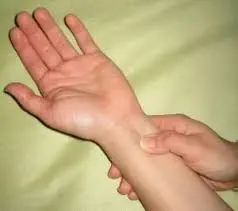By Xiaomei Cai, L.Ac., Ph.D. and Qineng Tan, L.Ac., Ph.D.

Feeling nauseous, nauseated, queasy? Feel like vomiting or throwing up? Nausea can be brought on by many different health conditions. Acupuncture and TCM can provide nausea help in many situations, whatever the cause of nausea.
Nausea is that feeling that you have to vomit, or throw up. It’s an uneasy feeling that is often referred to as being “sick to your stomach.” Feeling nauseous may or may not precede actually vomiting.
Nausea is a symptom, not a disease in and of itself. There are many different kinds of health issues that can make you feel nauseated, or cause you to vomit.
Symptoms of Nausea
A queasy stomach is often accompanied by other symptoms. Nausea can often include or coincide with:
- Feeling like you are going to vomit
- Stomach ache, pain in belly
- No appetite, stomach turns at the thought or sight of food
- Sweating, clammy skin
- Salivating, swallowing a lot
- Uneasy feeling in the back of your throat
- Contractions of the respiratory or abdominal muscles
- Retching
- Dizziness
- Headache
Sometimes people feel nauseous after eating, or have a headache and nausea, or dizziness and nausea.
Some of the most common causes of nausea are a stomach flu, or gastrointestinal virus, morning sickness during pregnancy, and motion sickness.
There are many reasons why a person may feel nauseated, related to various health conditions.
Acupuncture and TCM provide a very effective way to help relieve nausea caused by all kinds of health issues.
Why Do I Feel Nauseous?

We all know what it is like to feel car sick or have a 24-hour stomach bug that makes us feel queasy and vomit. But sometimes we have recurrent nausea and do not know why.
The cause of nausea can sometimes be hard to pinpoint, if nausea comes and goes, or becomes a chronic, ongoing problem.
Top 10 Causes of Nausea
The medical conditions that most commonly cause nausea include:
- GERD – Acid reflux can cause excess salivation and regurgitation of food
- IBS – irritable bowel syndrome can lead to changing symptoms of nausea, gas, diarrhea, and constipation
- IBD – inflammatory bowel disease like ulcerative colitis can cause nausea, abdominal pain, and diarrhea
- Hepatitis – HBV or Hepatitis C can cause loss of appetite, nausea, and abdominal pain
- Migraines – nausea and vomiting can be part of a migraine headache
- Meniere’s disease – inner ear problem that can cause dizziness, vertigo, and nausea
- Anxiety – anxious feelings, depression, and other mental health issues like claustrophobia or PTSD can cause nausea
- Pregnancy – morning sickness
- Diverticulitis – inflamed sacs in the intestine can cause gas, bloating, and nausea
- Guillain-Barre syndrome – autoimmune disease affecting the neurological system can cause nausea in addition to muscle weakness and fatigue
- HIV/AIDS – people experiencing the acute phase of HIV often feel nauseated and fatigued
Being constipated can cause nausea.
Bacterial meningitis, swelling of the brain that can happen due to a bacterial or viral infection, can cause nausea, vomiting, and fever.
Celiac disease, an autoimmune disorder that affects digestion, can often cause nausea, bloating, and abdominal pain.
People often feel nauseated or vomit when experiencing a gallbladder attack or when passing a kidney stone.
Hormonal changes during PMS, the menstrual period, ovulation, and pregnancy can cause nausea.

Nausea and vomiting can often be side effects of medications that are used to treat some conditions. Opioid painkillers, in particular, can cause dizziness and nausea.
Stomach ulcers, or peptic ulcers, can cause nausea, as can gastroparesis.
Antibiotics can cause nausea and diarrhea. Even NSAIDs like Ibuprofen and and Motrin can cause nausea or stomach upset. Some blood pressure medications can also cause queasiness.
Feeling nauseous is a common side effect of chemotherapy for cancer treatment.
TCM has acupuncture protocols and herbal formulas to help alleviate the nausea associated with all of the conditions listed above.
Nausea Medicine
Most people probably have OTC preparations to relieve nausea and stomach upset in their medicine cabinet, such as Pepto-Bismol, or Dramamine to prevent motion sickness.
If you seek medical care for recurrent or chronic nausea, you may be prescribed antiemetics (such as promethazine), which block the receptors in the brain that trigger nausea sensation.
Drugs known as prokinetic agents work by affecting the lower esophageal sphincter and moving food more quickly through the digestive system. Erythromycin and domperidone are examples.
Certain antihistamines, like Benadryl, are also sometimes prescribed to help reduce nausea, as they block certain chemical responses and reduce stomach acids that can cause nausea.
More recently, cannabinoids may be used medicinally to help quell nausea. These may be prescribed as a synthetic form of TCH.
While these medications may help to relieve nausea in some cases, they do generally come with side effects, like drowsiness, dizziness, constipation, or vision problems.
Acupuncture is widely considered to be an effective modality to treat nausea, without any side effects.
Can Acupuncture Help Nausea?
One of the foundational principles of TCM theory is that an acupuncturist may use the “same treatment for different diseases.”
This means that while a condition, such as nausea, may be caused by any one of several different internal or external factors, the treatment may be the same. It also refers to the concept that many different types of conditions can be caused by a disharmony in a particular organ system.
Therefore, using acupuncture and herbs to bring balance to a particular organ system can help relieve many disorders that would be considered separate and distinct from one another in modern conventional medicine.

There are several key acupuncture points that will have a positive effect on the reduction of nausea, and no matter what is the cause of nausea, they will work in many cases to alleviate nausea in the short term. The point known as P6, in particular, is a classic point for quickly quelling queasiness.
Beyond that, a TCM practitioner will look carefully at other symptoms to find the root cause, which may be related to a deficiency of stomach or spleen Qi. These are the organs primarily responsible for the processing of food. If there is too much heat or phlegm in the stomach or spleen, there will be indigestion.
Emotional factors can also affect the stomach Qi. Worry, repetitive thoughts and rumination are associated with stomach problems in TCM. Acupuncture can also help to relieve the physical and emotional symptoms of anxiety.
The liver also plays a role in digestion, by producing bile. So when any one of these organs is stagnant or not functioning smoothly, it can cause indigestion and the reversal of stomach Qi – causing the energy to move upwards rather than downwards.
One study of patients suffering from mild to moderate nausea and dyspepsia who had not responded to conventional medications showed that symptoms were greatly reduced after just three acupuncture sessions.
Acupuncture can help relieve nausea caused by morning sickness and other conditions because it affects the release of endorphins and ACTH, a pituitary hormone that inhibits the vomiting trigger response.
A research study that looked at thousands of cases found the acupuncture was effective at reducing nausea due to morning sickness, as well as postoperative nausea and chemotherapy induced nausea.
Chinese herbs can also be used to help balance the organ Qi and to relieve stomach upset. Your acupuncturist will create a formula that addresses both nausea symptoms and the deeper issues that are the cause of nausea.
Ginger is also one of the most effective natural remedies for nausea. A few slices of fresh ginger, with the skin still on, steeped in hot water as a tea can help relieve nausea in many situations.
Acupuncture Near Me for Nausea in Los Angeles
TCM offers nausea help for people of all ages, with all types of health issues. Drs. Tan and Cai at Art of Wellness in West Los Angeles have 35 years of experience helping people with all types of gastrointestinal disorders, hormonal conditions, and autoimmune conditions. Our expertise in reproductive health allows them to help women who experience morning sickness or nausea during ovulation or menstrual issues. We also have extensive experience helping cancer patients who are undergoing chemotherapy feel more comfortable and deal with side effects of cancer treatment.
*This article is for education from the perspective of Traditional Chinese Medicine only. The education provided by this article is not approved by FDA to diagnose, prevent, treat and cure human diseases. It should not stop you from consulting with your physician for your medical conditions. Traditional Chinese Medicine is based on Qi, which is an invisible force that usually cannot be observed by modern science. Because science focuses on testing ideas about the natural world with evidence obtained through observation, these aspects of acupuncture can’t be studied by science. Therefore acupuncture and Chinese herbs are often not supported by double-blind, randomized trials, and they are considered alternative medicine therapies in the United States.
